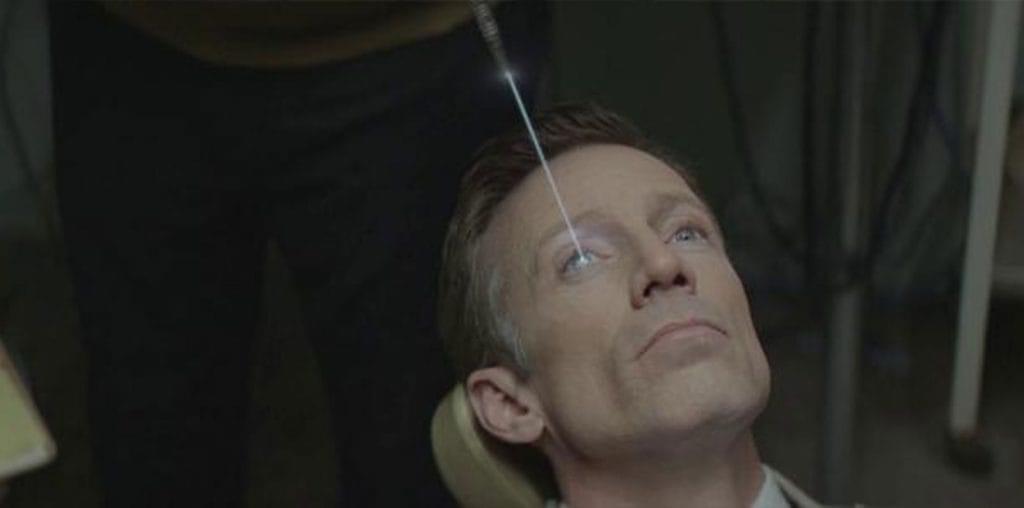
Chris Browne fixes my “broken” tape recorder and cues it faster than I can write this sentence. I know this because I timed him. It took him less than 20 seconds, and it’s been days since I wrote anything more than “Chris Browne.”
With that kind of competence, it’s no wonder the 45-year-old, who grew up on a farm in rural Jamaica – with no electricity or telephones until he was twelve – has the kind of self-assurance less confident people fake.
Confidence, I am about to learn (unlike with writing, which demands a great degree of self-loathing) is the key to success in the film business. It’s a lesson Browne learned watching his best friend from film school, Janusz Kamanski, become Spielberg’s favorite cinematographer, an Oscar winner (“Schindler’s List”) and a two-time Academy nominee (“Amistad” and “Saving Private Ryan”).
“The great thing about Janusz,” recalls Browne (pronounced Brownee), “was that he was so ballsy.”
“I remember being really impressed when he got the chance to work with Spielberg. When I called him about it, I was like: ‘wow you must have learned a lot from him.’ And he said, ‘Spielberg’s learned from me too.’ That sums up Janusz. He was always bold, more so than me.”
Well, not exactly.
Browne, too, has shown a penchant for boldness. Like the time he helped producer, Carolyn Pfeiffer resurrect a script mired in development hell.
Pfeiffer, then working with Palm Pictures, an audio/visual entertainment company owned by Island Records founder and Rock and Roll Hall of Fame inductee, Chris Blackwell, had seen her British/American scriptwriter’s unable to pull anecdotes of corruption and extra-judicial executions out of Jamaica’s policemen. Without the hardened cops’ stories the script lacked authenticity. “One of the problems with the crime aspect of the script was the focus on counterfeiting,” says Browne, who films in inner-city communities few others dare to, “one of the first changes I made was to switch that focus to gun smuggling, which was more relevant.”
Incidentally, Browne is likely the only director in Jamaica to have had his set shot up by gunmen. “It was a one-off thing,” says Browne, who is careful not to make the story sound anymore sensational than I already think it is. “I was filming a music video in Central Kingston in the middle of general elections, when gunmen shot up a group of people on the corner playing ludo (snakes and ladders) and dominoes. I thought – is this real? I wanted to take pictures. But the batteries in my camera were dead. That’s when one of the shooters, while changing his 9mm magazine cool as ever, turned towards my crew and me and started firing. One of our guys (from Martinique) got shot in the back. We took him to the Kingston Public hospital where he was admitted in stable condition. His people wanted to take him back to Martinique to have the bullet taken out and we’re like – you’re crazy, how often do people get shot in Martinique? Have our doctors do it here, getting shot around here is an everyday thing.”
To give the script the genuine street element it needed, Browne worked his own community contacts and got well-placed friends to get Kingston’s most feared crime fighters talking. Meetings went so well Browne was allowed to ride with police patrols to get details firsthand.
Until then, Browne’s only filmmaking experience had come from self-funded short features, and a series of behind-the-camera work on big budget movies shot in Jamaica (“Club Paradise”, 1985; “Cocktail”, 1988; “Cool Runnings”, 1992; and “How Stella Got Her Groove Back”, 1997). But as part of the deal with Pfeiffer, Browne wasn’t just doing rewrites, he would be given the opportunity to direct.
With Browne in the director’s chair, the movie – “Third World Cop” (1998) – went on an unprecedented four-month run, grossing $600,000 in gate receipts, the most ever for a locally-made film. It made more money in Jamaica than the individual Caribbean grosses of “Titanic” and “Star Wars: The Phantom Menace” – excellent business for a film shot in only 21 days.
Six years later Browne is set to show “Cop” was no fluke. He’s raising the stakes with his newest movie, “Ghett’a Life.” Like the Oscar nominated, City of God, an independent film about life in the slums of Rio de Janeiro (by Brazilian Fernando Meirelles), “GL” also tells a story that may win it critical acclaim.
Set in Jamaica’s inner-city, and in the middle of Jamaica’s bi-polar tribal politics, GL is a cross between, Billy Elliot: the Oscar nominated coming-of-age story of a boy who dares to become a ballet dancer in a testosterone-filled Irish coal-mining town and Rocky.
The story came to Browne after he accepted an invitation from Peace Corp workers to attend a “Fight Club”-styled boxing match in a depressed Kingston community. “It was amazing,” says Browne, who enjoys re-creating the scene. “You had to pay to go in. There was a bar, and a car park – it was fenced off and there was a ring in the middle. The under card was a 70-year-old and a twenty-year-old going at it to settle a dispute over a girl. A whole lot of people were there and the fighters were really getting into it. Most of them were just beating the s**t out of each other, I mean they had no boxing experience. They were just whaling away on one another. But it was hilarious and I was like, ‘wow, I could build a story around this vibe’.”
Finding a story that would play itself out in Jamaica’s boxing underworld meant visiting Jamaica’s broken down gyms and interviewing its equally broken down fighters. The most promising story belonged to a world-rated boxer named Richard “Shrimpy” Clarke, who in 1990 fought for and lost the World Flyweight Boxing title to Sot Chitalada (and who is perhaps more famous for his seemingly brittle frame than his boxing prowess, hence the nickname Shrimpy.)
Clarke, who started boxing as a pre-teen, never let on the fact to his parents. That is until his invitation to a Caribbean championship meant letting his parents in on his secret life. Amazed and ultimately impressed by his talent (Shrimpy had run around the neighborhood collecting all the trophies and belts he had stored at the homes of friends) Shrimpy’s parents applied for his passport.
The story had potential, but when Browne asked Shrimpy why the secrecy in the first place, the notoriously deadpan Shrimpy could only come up with, “no reason.” Without conflict, Browne’s protagonist had nothing to resolve.
“That’s when I came up with the twist of the hero wanting to box but only being able to do it in a gym situated on one side of the political fence,” explains Browne, “ the side to which his father is deadly opposed.”
Recently retired world heavyweight champion, Lennox Lewis, has already agreed to appear in the film, and producer Rupert Harvey, (“Bones”, “Plunkett & Macleane”, “Pump Up the Volume”) has raised more than two-thirds of the $3 million budget.
Although Browne has come a long way, he isn’t resting on his laurels. Says Browne, “A good friend of mine, who’s been in the film business for some time, said to me after ‘Cop’, ‘it’s all good and well, that you made one film but nobody in Jamaica has ever made two.’ Well, after I make this one, I want to make another one, and one more after that, and I want to keep doing it.”
With thousands of Jamaican movie fans eager to see and hear themselves onscreen, Browne may just get his wish.


I have written a movie script that I would like to share with mr. Browne.
I may be contacted @ ***-**** or ***-****
I would like to contact Mr. Borwne to discuss this script.
Thanks
You commented on a 6 year old story with your phone number? I blocked the digits for your own good. Seriously.